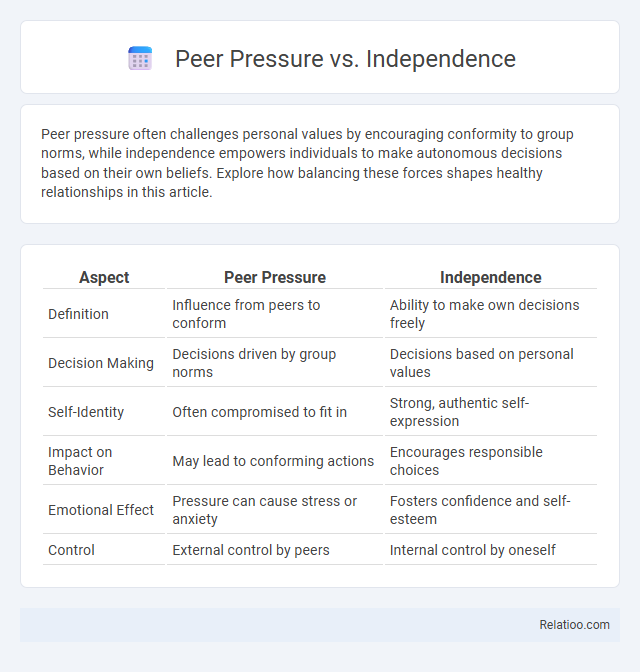Peer pressure often challenges personal values by encouraging conformity to group norms, while independence empowers individuals to make autonomous decisions based on their own beliefs. Explore how balancing these forces shapes healthy relationships in this article.
Table of Comparison
| Aspect | Peer Pressure | Independence |
|---|---|---|
| Definition | Influence from peers to conform | Ability to make own decisions freely |
| Decision Making | Decisions driven by group norms | Decisions based on personal values |
| Self-Identity | Often compromised to fit in | Strong, authentic self-expression |
| Impact on Behavior | May lead to conforming actions | Encourages responsible choices |
| Emotional Effect | Pressure can cause stress or anxiety | Fosters confidence and self-esteem |
| Control | External control by peers | Internal control by oneself |
Understanding Peer Pressure: Definition and Types
Understanding peer pressure involves recognizing it as the influence exerted by a group to encourage individuals to change their attitudes, values, or behaviors to conform. There are various types, including positive peer pressure, which promotes beneficial behaviors like academic achievement, and negative peer pressure, which may lead to risky or harmful actions such as substance abuse or bullying. Your ability to identify these types helps maintain independence while navigating social dynamics effectively.
The Concept of Independence in Personal Development
Independence in personal development is the ability to make decisions based on your own values and beliefs, free from external influences like peer pressure. Cultivating independence strengthens self-confidence and critical thinking skills, empowering you to navigate social dynamics while maintaining authenticity. This balance helps you build resilience and fosters genuine personal growth amid external expectations.
How Peer Pressure Manifests in Daily Life
Peer pressure manifests in daily life through subtle social cues, expectations, and the desire for acceptance within groups, influencing decisions related to fashion, behavior, and lifestyle choices. It often appears in situations such as school environments, workplace dynamics, and social gatherings where individuals may feel compelled to conform to group norms despite personal beliefs. The tension between peer pressure and independence becomes evident as individuals strive to maintain autonomy while navigating social influences that encourage conformity.
The Psychological Effects of Peer Influence
Peer pressure significantly shapes adolescent behavior by impacting self-esteem and decision-making processes, often leading to conformity or risk-taking to gain social acceptance. Independence fosters critical thinking and self-confidence, allowing individuals to resist negative peer influence and develop personal values. Understanding the psychological effects of peer influence helps in promoting resilience and mental well-being during crucial developmental stages.
Benefits and Challenges of Striving for Independence
Striving for independence fosters self-confidence, critical thinking, and decision-making skills, enabling individuals to navigate life with greater autonomy. Challenges include resisting peer pressure, managing possible social isolation, and balancing personal values against group influence. Successful independence requires resilience to peer dynamics while maintaining supportive relationships.
Peer Pressure in Adolescence vs. Adulthood
Peer pressure exerts a stronger influence during adolescence due to heightened sensitivity to social acceptance and identity formation, leading teens to conform to group norms more readily. In adulthood, peer pressure diminishes as individuals develop greater self-awareness, autonomy, and established personal values, enabling more independent decision-making. Understanding the neurological and social factors differentiating peer influence across these life stages is crucial for promoting healthy development and resilience.
Strategies to Resist Negative Peer Pressure
Building strong self-confidence and clear personal values empower You to resist negative peer pressure effectively. Developing assertive communication skills and practicing saying "no" firmly helps maintain Your independence. Surrounding Yourself with supportive friends who respect Your choices further strengthens Your ability to stay true to Your principles.
Building Self-Confidence for Greater Independence
Building self-confidence is essential for fostering greater independence by empowering you to make decisions aligned with your values rather than succumbing to peer pressure. Developing strong self-awareness and assertiveness skills helps resist external influences, promoting autonomy and personal growth. Consistent practice of self-confidence techniques strengthens your ability to maintain independence amid social challenges.
Balancing Social Belonging with Personal Values
Balancing social belonging with personal values requires navigating peer pressure while maintaining your independence, ensuring that your decisions reflect genuine beliefs rather than merely conforming to group expectations. Developing self-awareness and strong personal boundaries enables you to resist negative peer pressure without isolating yourself from important social connections. Cultivating this balance fosters authentic relationships and supports long-term emotional well-being.
Empowering Youth to Make Independent Choices
Empowering youth to make independent choices involves fostering critical thinking skills that help them evaluate peer pressure effectively. Developing a strong sense of self-confidence and self-awareness enables young individuals to resist negative influences and align their actions with personal values. Encouraging open communication and supportive environments strengthens their ability to navigate social dynamics while maintaining autonomy.

Infographic: Peer pressure vs Independence
 relatioo.com
relatioo.com